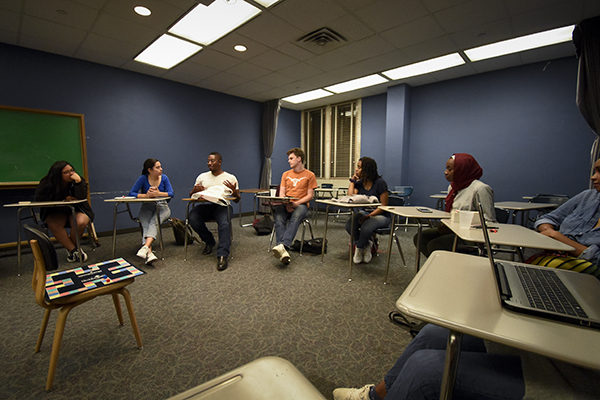Shams Alkamil arrived on campus and saw organizations for Muslim students and for black students, but none for people who identify as both.
Alkamil, a human development and family sciences senior, founded the UT Black Muslims Alliance to create a space for those who feel discriminated against and isolated on the Forty Acres. According to a study by Pew Research Center, less than one-third of American Muslims are black. Alkamil said she wanted to create a space on campus where the intersectionality of these two identities is represented.
“I was thinking of starting UT Black Muslims Alliance some time ago, but honestly I was scared to,” Alkamil said. “What triggered me to start the organization this past summer was that my country, Sudan, was under horrible political and social strife and everyone around me was saying nothing.”
Aiming to celebrate culture and black excellence, members of the organization are from all disciplines and majors and represent many countries. The organization strives to unite Muslim students at UT, where members said just a few months ago they felt like there was no real representation in the form of an alliance on campus.
Alkamil said a lot of the racism and colorism she has experienced is rooted in general anti-blackness, so the alliance is necessary for uplifting and representing black people.
“I was vice president of another large Muslim organization here on campus, and I felt so excluded,” Alkamil added. “I asked myself why that is and what it really came down to was the fact that there was an obvious cultural difference between my background and theirs.”
Ameen Williams, English senior and BMA finance director, said the University provides many resources for Muslim students, but the black identity that she feels is a large part of her Islamic culture often goes unnoticed.
“The school often fails to recognize the significant role America’s black population has played in laying the groundwork for the success of the religion in this country,” Williams said.
Jenab Camara, linguistics and French junior and BMA vice president, said the alliance is important to the University because of the group’s dedication to providing a platform for people who have been historically underrepresented.
“Usually when people think of Muslims they think Arab or Southeast Asian or South Asian,” Camara said. ”Hardly anybody recognizes some African countries as Muslim countries too.”
Alkamil said that the formation of the alliance has caused controversy in certain circles on campus who perceive the organization as a means of separating Muslims.
“I think the biggest challenge we are going to face as an organization is that it will spark controversy,” Alkamil said. “We understand that people are always going to have an opinion, and we just need to stick to our main goal of representation. That’s it.”





















